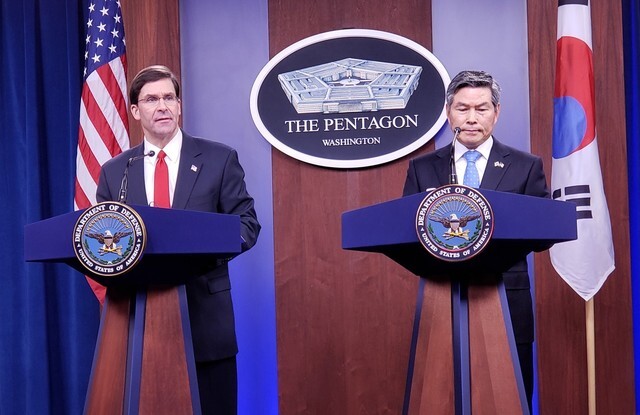hankyoreh
Links to other country sites 다른 나라 사이트 링크
S. Korea, US merely reaffirm major differences on defense cost-sharing during bilateral meeting

The South Korean and US defense ministers reaffirmed their deep differences on the issue of defense cost-sharing at a bilateral meeting in the US on Feb. 24. The situation is the latest development in the two sides’ difficulties surrounding the amount of the increase in South Korea’s financial contribution to stationing US troops.
South Korean Minister of National Defense Jeong Kyeong-doo and US Secretary of Defense Mark Esper met at the Pentagon in Arlington near Washington, DC, that afternoon to discuss matters including the Special Measures Agreement (SMA) on defense cost-sharing, efforts to strengthen the South Korea-US alliance, and the transfer of wartime operational control (OPCON). In a joint press conference after the meeting, Jeong and Esper showed their heated differences on the issue of South Korea’s share of defense costs.
In his introductory remarks at the press conference stressed, “Shouldering the cost of our common defense cannot fall disproportionately to the American taxpayer.”
“South Korea can and should contribute more to its defense,” he added.
He went on to say that “the current Special Measures Agreement captures only a portion of the overall costs associated with the United States' defense of South Korea.”
Jeong called for a swift resumption of negotiations, emphasizing South Korea’s various contributions to the stationing of US Forces Korea (USFK) and its willingness to accept a higher share of defense costs than last year. In his introductory remarks at the press conference, he noted that the South Korean government had allocated a defense budget of some US$43 billion this year for the achievement of critical military capabilities.
“The ROK government is contributing in various forms both directly and indirectly besides the SMA to USFK to realize peace through strength,” he stressed.
In a Q&A session, Jeong noted, “Last year was also a very big increase for us in terms of the 8.2% increase that we had for the SMA contribution.”
“During the 11th SMA negotiations, we are [. . .] thinking about increasing [the rate compared to last year],” he continued.
“It is also true that there still remains a difference in position in regards to the large increase that has been proposed from the US side,” he said.
In connection with this, a senior South Korean government official said, “More than any other area, it’s the amount of the increase that South Korea and the US disagree on the most.”
“That disagreement stems from how big the [figure] is that the US, and President Donald Trump in particular, is talking about,” the official added.
This suggests that even with the US reportedly having lowered its demands somewhat recently from the US$5 billion increase it was initially asking for in the defense cost-sharing negotiations -- a fivefold increase from the current level -- the differences between the two sides remain wide.
The US previously warned that it may implement unpaid furloughs to South Korean workers with USFK as of Apr. 1 if the conclusion of the defense cost sharing talks is delayed.
Jeong explained that he had suggested an approach to Esper that involves reaching an initial deal to maintain personnel costs at last year’s levels to prevent the furloughs while the cost-sharing negotiations continue. The plan had already been suggested to the US through the defense cost-sharing negotiation delegation, he added. According to a South Korean government official, Esper merely said he “understood” Jeong’s proposal without indicating whether it would be accepted.
When asked by a reporter of the debate over redeploying a Terminal High Altitude Area Defense (THAAD) system in addition to one stationed in Sangju, North Gyeongsang Province, Esper said, “[T]here are no plans to redeploy THAAD on the peninsula at this time.”
By Hwang Joon-bum, Washington correspondent
Please direct comments or questions to [english@hani.co.kr]

Editorial・opinion
![[Editorial] Yoon must halt procurement of SM-3 interceptor missiles [Editorial] Yoon must halt procurement of SM-3 interceptor missiles](https://flexible.img.hani.co.kr/flexible/normal/500/300/imgdb/child/2024/0501/17145495551605_1717145495195344.jpg) [Editorial] Yoon must halt procurement of SM-3 interceptor missiles
[Editorial] Yoon must halt procurement of SM-3 interceptor missiles![[Guest essay] Maybe Korea’s rapid population decline is an opportunity, not a crisis [Guest essay] Maybe Korea’s rapid population decline is an opportunity, not a crisis](https://flexible.img.hani.co.kr/flexible/normal/500/300/imgdb/original/2024/0430/9417144634983596.jpg) [Guest essay] Maybe Korea’s rapid population decline is an opportunity, not a crisis
[Guest essay] Maybe Korea’s rapid population decline is an opportunity, not a crisis- [Column] Can Yoon steer diplomacy with Russia, China back on track?
- [Column] Season 2 of special prosecutor probe may be coming to Korea soon
- [Column] Park Geun-hye déjà vu in Yoon Suk-yeol
- [Editorial] New weight of N. Korea’s nuclear threats makes dialogue all the more urgent
- [Guest essay] The real reason Korea’s new right wants to dub Rhee a founding father
- [Column] ‘Choson’: Is it time we start referring to N. Korea in its own terms?
- [Editorial] Japan’s rewriting of history with Korea has gone too far
- [Column] The president’s questionable capacity for dialogue
Most viewed articles
- 1Months and months of overdue wages are pushing migrant workers in Korea into debt
- 2At heart of West’s handwringing over Chinese ‘overcapacity,’ a battle to lead key future industries
- 3[Editorial] Yoon must halt procurement of SM-3 interceptor missiles
- 4Fruitless Yoon-Lee summit inflames partisan tensions in Korea
- 5Trump asks why US would defend Korea, hints at hiking Seoul’s defense cost burden
- 6Dermatology, plastic surgery drove record medical tourism to Korea in 2023
- 71 in 3 S. Korean security experts support nuclear armament, CSIS finds
- 8[Editorial] New weight of N. Korea’s nuclear threats makes dialogue all the more urgent
- 9South Korea officially an aged society just 17 years after becoming aging society
- 10[Column] For K-pop idols, is all love forbidden love?